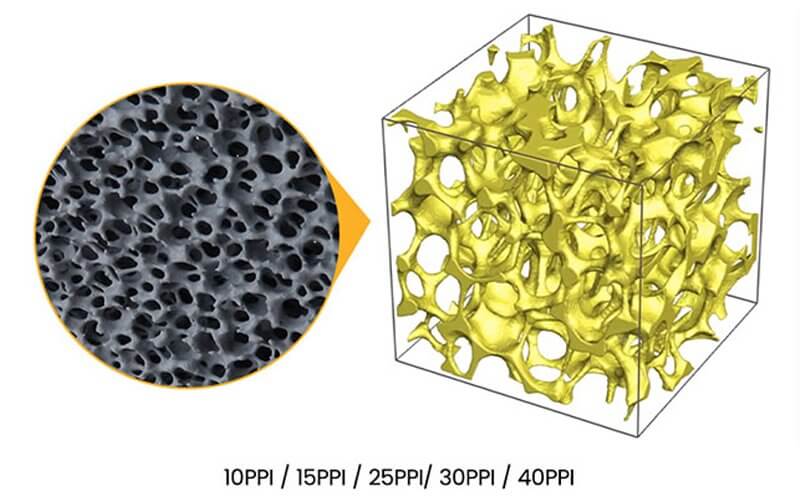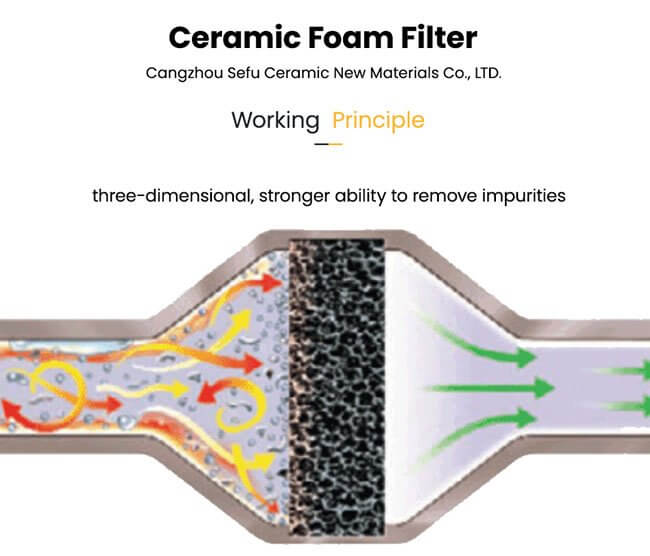Introduction:
Silicon carbide (SiC) ceramic foam filters have gained significant attention in various industries due to their unique properties and versatile applications. SiC filters, known for their high-temperature stability, excellent chemical resistance, and superior filtration capabilities, have found applications in diverse fields such as metal casting, molten metal filtration, wastewater treatment, and more. This essay explores the extensive range of applications for silicon carbide ceramic foam filters, highlighting their advantages, performance, and contributions to various industrial processes.
Section 1: Overview of Silicon Carbide Ceramic Foam Filters
Silicon carbide ceramic foam filters are highly porous structures made from SiC material. The foam-like structure comprises interconnected pores, providing a large surface area and excellent filtration characteristics. SiC filters are manufactured through a process that involves impregnating a polymeric sponge with ceramic slurry, followed by thermal processing to remove the organic components and sinter the SiC particles together. The resulting SiC ceramic foam filters possess exceptional thermal and chemical stability, making them suitable for high-temperature applications involving aggressive molten metals.

Section 2: Advantages of Silicon Carbide Ceramic Foam Filters
2.1. High-Temperature Stability: One of the key advantages of SiC ceramic foam filters is their ability to withstand extreme temperatures. SiC has a high melting point and exhibits excellent thermal stability, making it suitable for applications in metal casting processes where molten metals are at elevated temperatures. The filters maintain their structural integrity, enabling efficient filtration without compromising their performance even under demanding operating conditions.
2.2. Chemical Resistance: Silicon carbide exhibits excellent chemical resistance, particularly to acids, alkalis, and corrosive molten metals. This resistance allows SiC ceramic foam filters to effectively filter out impurities without being chemically degraded. The filters can withstand the corrosive nature of molten metals and aggressive chemical environments, ensuring long-lasting performance and filtration efficiency.
2.3. Superior Filtration Efficiency: SiC ceramic foam filters provide exceptional filtration efficiency, thanks to their high porosity and interconnected pore structure. The filters effectively capture and retain a wide range of impurities, including inclusions, slag, oxides, and other unwanted particles. This leads to improved casting quality, reduced defects, and enhanced product performance in industries such as foundries and metal casting.
2.4. Mechanical Strength and Durability: SiC ceramic foam filters exhibit excellent mechanical strength, ensuring their durability during the filtration process. Their robustness allows for effective filtration and retention of impurities without compromising the structural integrity of the filter. This mechanical strength contributes to the filters’ longevity, reducing the need for frequent replacements and increasing operational efficiency.
Section 3: Applications of Silicon Carbide Ceramic Foam Filters
Metal Casting:
SiC ceramic foam filters find extensive applications in the metal casting industry. They are used for the filtration of molten metals, such as Iron & Alloy, nodular cast iron, gray iron, brass, bronze, etc. SiC filters effectively remove impurities, including inclusions, oxides, and slag, resulting in improved casting quality and reduced defects. The high filtration efficiency of SiC filters ensures clean and high-quality metal castings, meeting industry standards and customer requirements.
Foundries:
Foundries rely on SiC ceramic foam filters to improve the quality and integrity of castings. The filters remove impurities and inclusions from the molten metal, enhancing the mechanical properties and surface finish of the castings. SiC filters also help minimize defects like sand inclusions, porosity, and gas defects, resulting in higher productivity and cost savings.
Molten Metal Filtration:
SiC ceramic foam filters are used for the filtration of various molten metals, including aluminum, iron, steel, and non-ferrous alloys. The filters effectively remove impurities and solid particles, such as oxides, slag, and dross, from the molten metal, resulting in cleaner and higher-quality castings. This contributes to the overall efficiency of metal casting processes and improves the final product’s performance.

Wastewater Treatment:
Silicon carbide ceramic foam filters are employed in wastewater treatment processes, particularly for the removal of heavy metals, organic compounds, and other contaminants. The filters act as a medium for adsorption and catalytic reactions, effectively removing pollutants from wastewater streams. The high porosity and large surface area of SiC filters enhance the contact between the wastewater and the catalyst, facilitating efficient pollutant removal and improving water quality.
Environmental Remediation:
SiC ceramic foam filters are utilized in environmental remediation processes, including the removal of pollutants and contaminants from air and water sources. The filters, coated with appropriate catalysts, can effectively degrade volatile organic compounds (VOCs), nitrogen oxides (NOx), and other harmful substances when exposed to light or heat. This application of SiC filters contributes to cleaner air and water, supporting sustainable environmental practices.
Filtration in Chemical Processing:
SiC ceramic foam filters find applications in various chemical processing industries. They are used for the separation and filtration of catalyst particles, impurities, and by-products in chemical reactions. The filters enhance process efficiency by ensuring cleaner and more efficient chemical products, reducing downstream purification steps, and minimizing waste generation.
Section 4: Future Developments and Innovations
Continuous research and development efforts focus on improving the performance and expanding the applications of silicon carbide ceramic foam filters. Advancements include exploring new SiC material compositions, optimizing filter structures, and developing innovative manufacturing techniques. Additionally, the integration of nanomaterials and composite structures into SiC filters is being explored to enhance their filtration efficiency, mechanical strength, and catalytic activity.
Researchers are also investigating the use of surface modifications and functional coatings to enhance the adsorption capacity, selectivity, and catalytic properties of SiC filters. These modifications can tailor the filters to specific applications, improving their performance in targeted gas or liquid filtration processes.
Moreover, efforts are being made to enhance the scalability and cost-effectiveness of SiC ceramic foam filters for large-scale industrial applications. Streamlining the manufacturing processes, optimizing filter designs, and exploring new production techniques contribute to reducing production costs while maintaining or improving filter performance.
Conclusion:
Silicon carbide ceramic foam filters offer a wide range of advantages and applications in various industries. With their high-temperature stability, excellent chemical resistance, superior filtration efficiency, and mechanical durability, SiC filters have become a vital component in metal casting, molten metal filtration, wastewater treatment, and other industrial processes. The versatility and reliability of SiC ceramic foam filters contribute to enhanced product quality, reduced defects, and improved process efficiency. Ongoing research and innovation in SiC filters will further optimize their performance, expand their applications, and contribute to the advancement of sustainable and environmentally friendly industrial practices. The utilization of SiC filters underscores their significance in enhancing industrial processes and promoting a more efficient and sustainable future.


